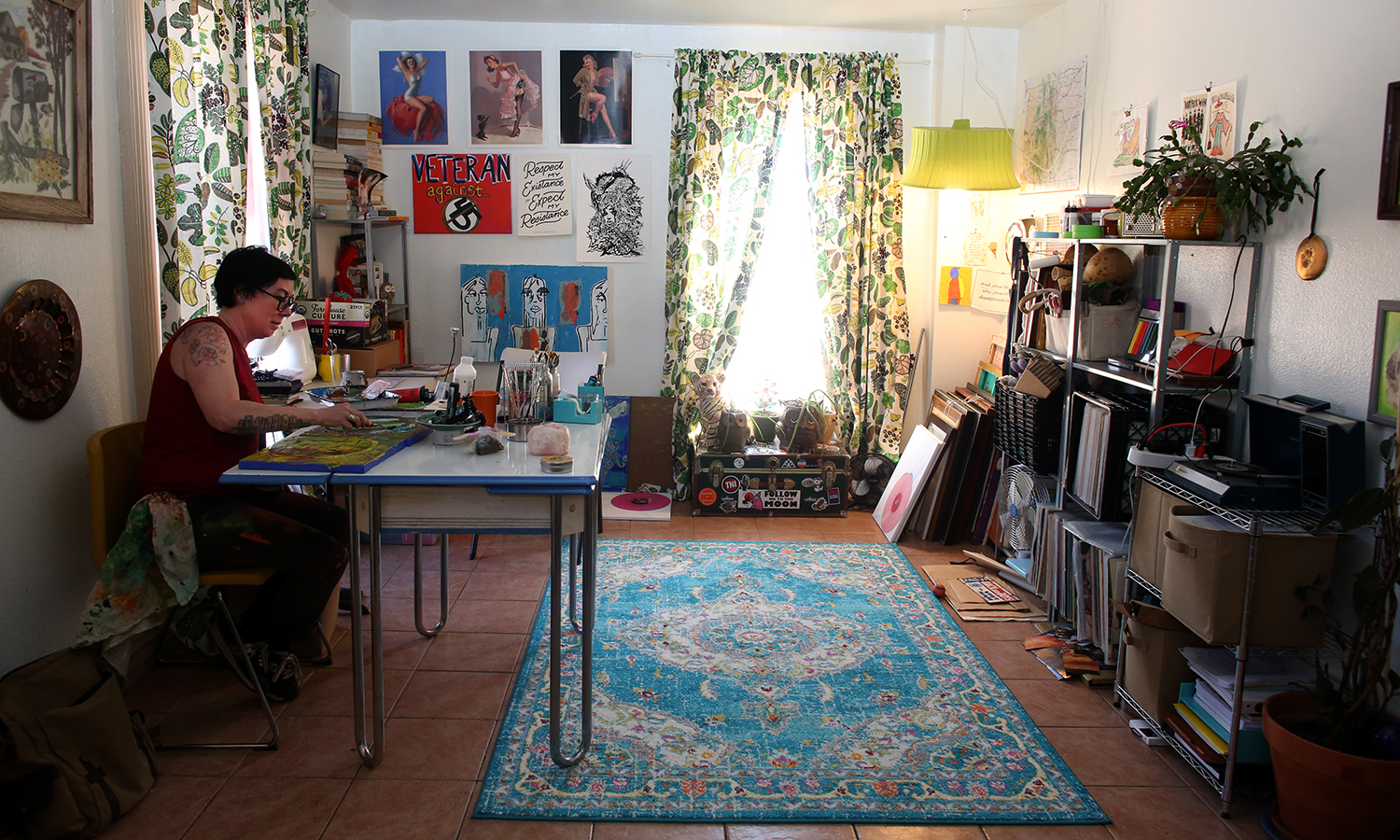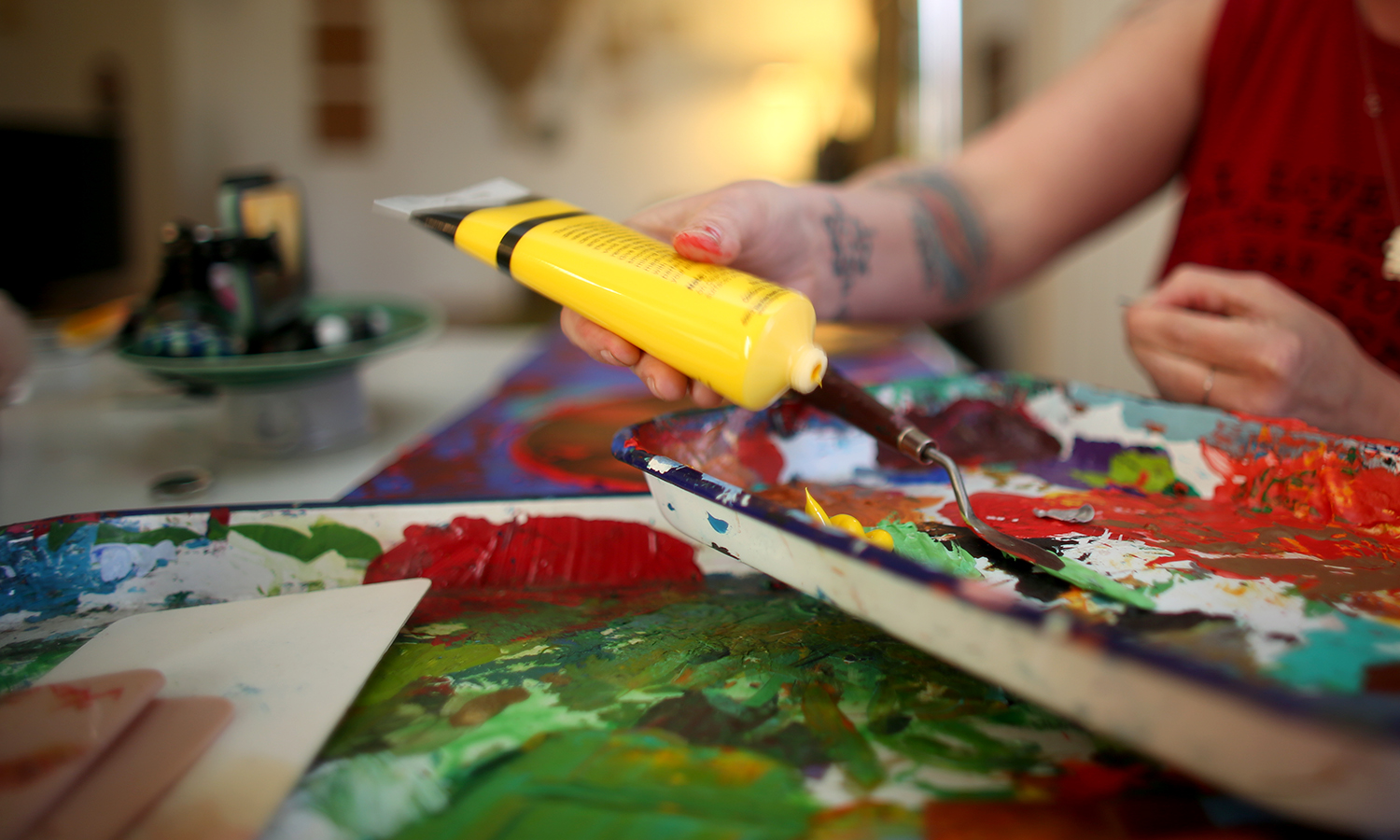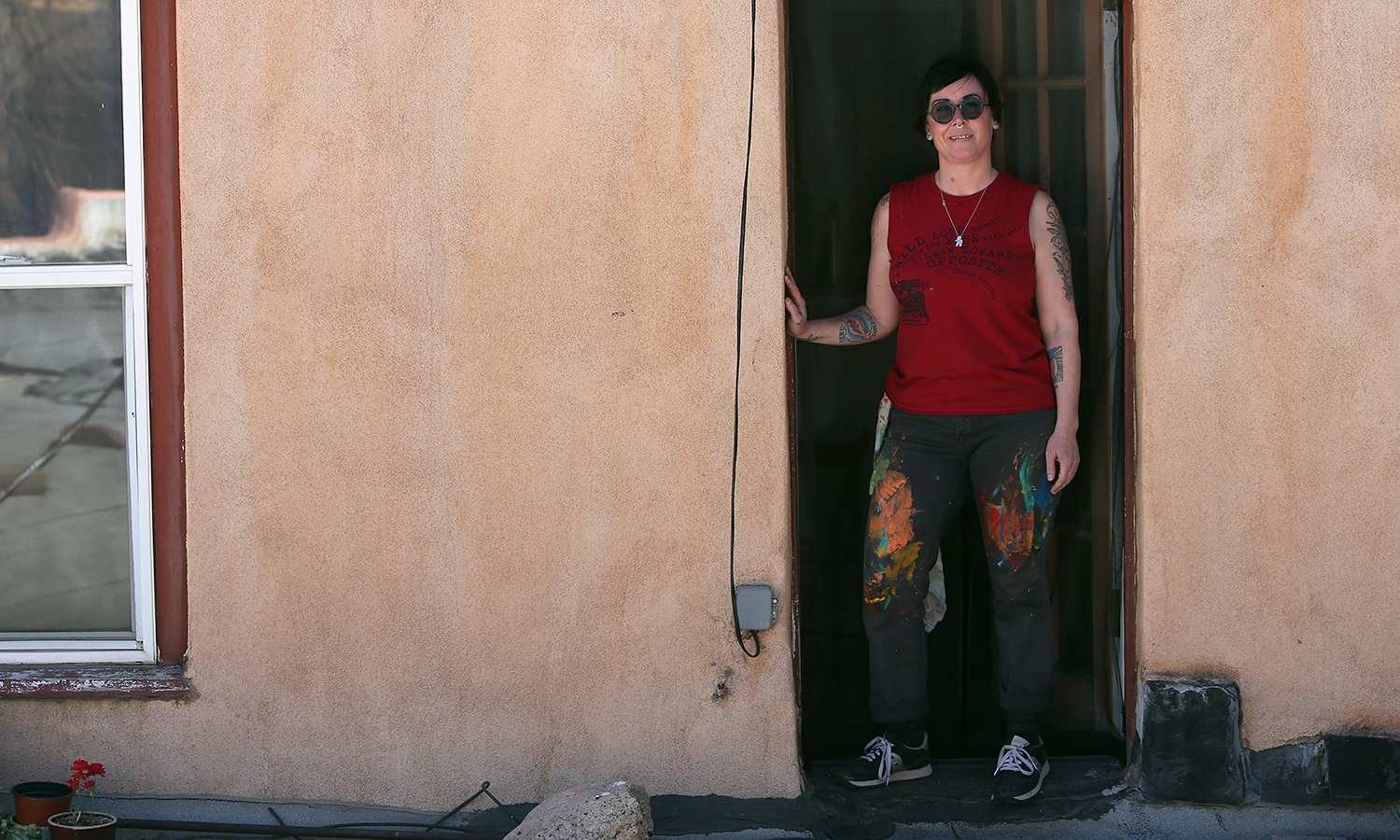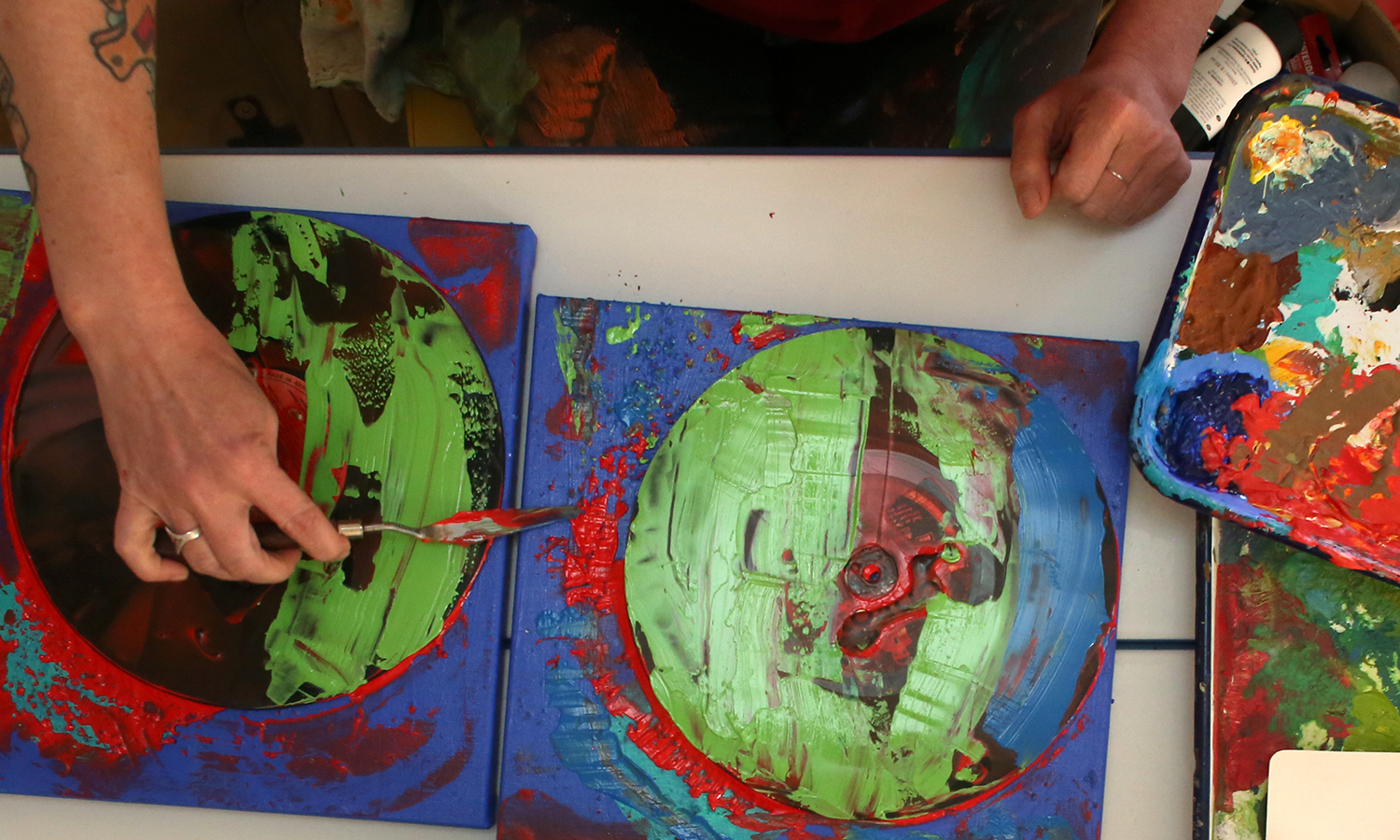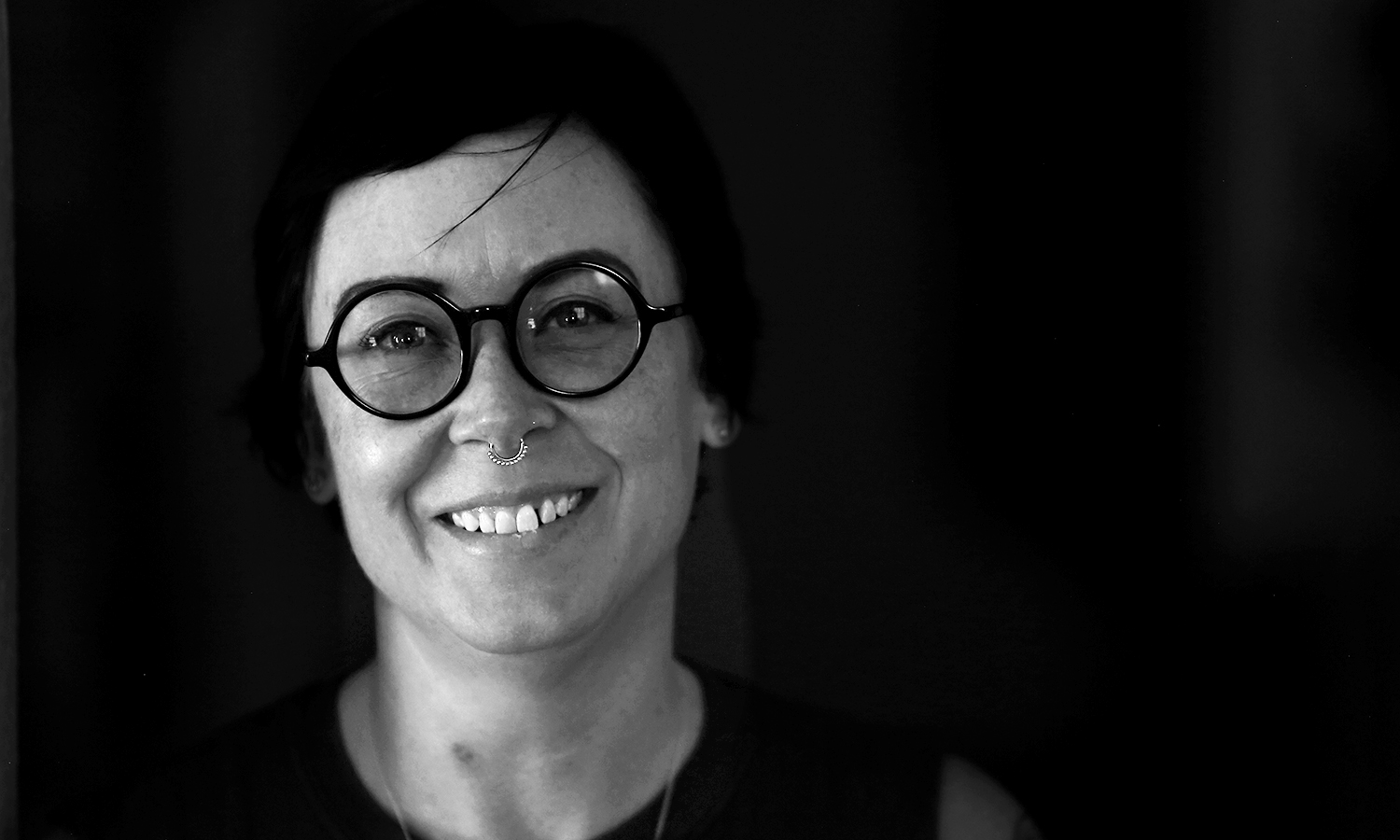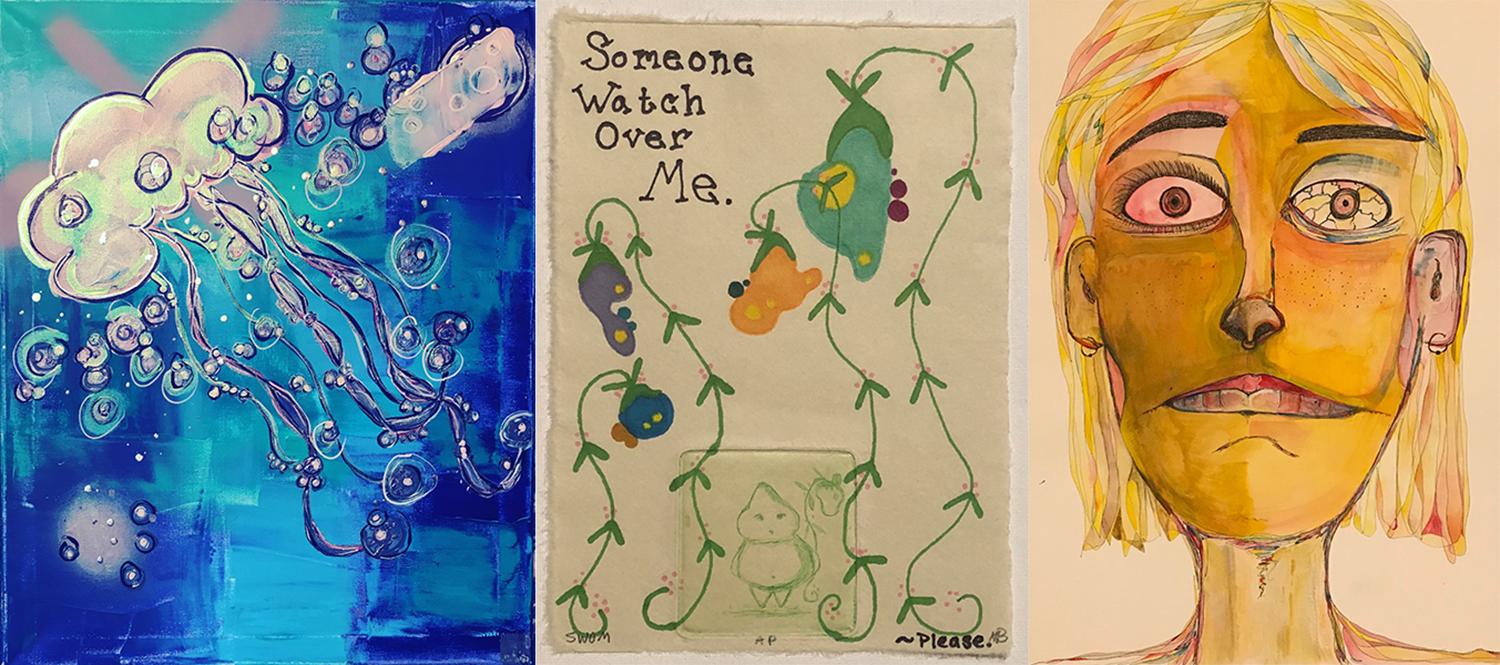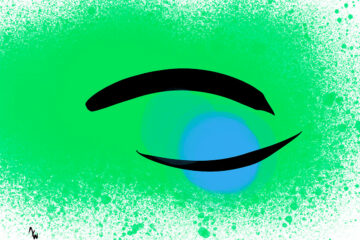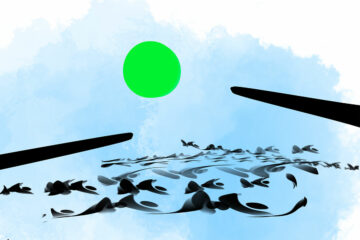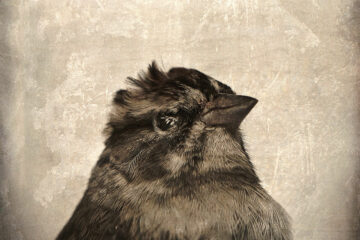KJ Becker pours freshly made coffee and we sit down in her home art studio with a view of Manitou Springs. She begins to make art, painting whatever she feels in each moment on vintage Austrian and German vinyl records.
“I use a lot of textures and I kind of just put a blob on and play with it. It’s nothing conceptual,” she says. “For me, art has always been about the movement and feeling good, and the surprise, the happy accidents.”
She spreads the paint, vivid color by color. Her phone rests on the table to capture an animated GIF of her work, which she will post on social media.
KJ, 40, talks with Humanitou about the soothing power of art, facing depression and post-traumatic stress (PTSD), experiences of being a woman in today’s world, advocacy for others, and her new venture Expressive Art Peer Support (EAPS).
Humanitou: EAPS is an art-based opportunity you started to help others. Would you call it art therapy?
KJ: I’m doing expressive art peer support. I can’t say “therapy,” because I don’t have a therapist’s license. I’m working on making it an LLC.
My background with working with people in art started in Chicago, at the Arts of Life. I literally walked in the door and cried, because it was exactly the place that I was supposed to be.
It was totally guerilla-style DIY, but it was a true community of people with intellectual and developmental disabilities and people without, in a community, working together.
A lot of the philosophies about why I’m doing this Expressive Art Peer Support come from there. I’ve seen someone go from a catatonic state to four years later speaking fluently, telling us what he wants to do, telling us what he doesn’t want to do.
That all came from one-to-one art making. He’s a great artist. Just having someone sit next to him, talking to him, he came out of his shell.
Humanitou: What is it with making art that you see is the power than can do this with people? I imagine this applies to every human being.
KJ: I think the power of art is that it’s childlike. It’s playful. There’s no rules. It can be anything. Nobody has to be able to understand it. You don’t have to understand it. I think just the plasticity of it, I guess, how it can be so many different things.
If people really just started making art for themselves in a self-soothing way, they’d find their niche and the childlike playfulness of art. I think that would appeal to anybody, to just let go and not think about anything, and just make something.
Humanitou: Why did you start EAPS?
KJ: I’ve been trying to get into an art therapist through the V.A. since June. It’s not available. Art therapy isn’t available for veterans in Colorado Springs where it’s one of the highest, most concentrated population of veterans? And in an arts town. That’s crazy to me. It’s scientifically proven that it helps tons of maladies.
I also worked in the developmental and intellectually disabled field. I have a lot of experience working with people with disabilities and art from the Arts of Life. I’d also like to work with people who have been victims of sexual violence.
There’s some selfishness in this for me. I love going to therapy. I love talking out stuff like this with people. What I like about the art component is that you don’t have to talk. You can express what you’re feeling in your creativity and you don’t even have to talk to me. It can be about the art, but what you’re feeling is going to come up in your art.
Humanitou: You are making art while we talk. It’s self-therapy?
KJ: For me, art is supposed to be fun. It’s supposed to make me happy.
Somebody with depression? That’s what I do to make myself happy. I’ve been to dance therapy and art therapy, and every time I go they tell me I am too closed in and stiff when I do art work.
So, they forced me to do a wall-sized piece of paper, where I was exposing myself and showing my belly, basically, being vulnerable. That is so uncomfortable to me, so uncomfortable.
Humanitou: There are reasons we all find what works for us, right? We have to narrow the world down in some way. I’m interested in how people find their techniques and interests, how they make art or why.
KJ: I like color, first of all. Making all these crazy motions and just seeing what comes out is the most beneficial thing for me.
Art doesn’t have to be about anything. It can just be, “Oh, I want to put a mark there. OK. I’m going to make that mark. How cool does that look?”
Humanitou: You have said you have post-traumatic stress (PTSD). Is that something you care to share, to talk about?
KJ: Yeah. PTSD, basically, came from me being constantly harassed in the military.
The first day I walked to my first duty station at Kelly Air Force Base (Texas), I had my bags on my back and was walking to my barracks and, all of a sudden, I start noticing all the doors on the floor are opening and there’s a bunch of guys coming out. I start hearing, “New meat! … New meat! … New meat!”
Humanitou: As a veteran myself, it’s all too easy to picture that. But it’s still appalling.
KJ: That was where it started. My solution to avoid getting harassed was to become a giant bitch. Nobody would (mess) with me then. I wore that label of being a bitch my entire military career, because I thought it would protect me. Well, it didn’t.
One night, there was a party. I had too much to drink. My girl friend took me to my room and tucked me into bed. My friend swore that she locked the door. But (the guy I’d recently broken up with) got into my room.
He, luckily, didn’t rape me, but he did make unwanted advances and touched me and wanted to have sex. I screamed at the top of my lungs, and that scared him and he left.
In September of 1996, I went to Prince Sultan Air Base in Saudi Arabia. I was over there for two months when I got a letter in the mail, saying I was going back to the States to testify in a court martial. After he had punched a woman in the face and broke her nose at a party, he was looked into a bit more.
They found he had raped 20 to 27 women on Lackland Air Force Base (Texas) and Kelly Air Force Base and Fort Sam Houston (Texas). All these women had come forward about it and I was called back to testify about what I experienced. He got 12 years at Leavenworth.
Now he’s out and I don’t know where he is, because I don’t get victim notification letters anymore. Maybe this is my PTSD paranoia, but how do I know he doesn’t have a list of people’s names and he’s just going down a list? That is a thing I think about. It might be illogical and irrational, but I can’t help thinking about it.
There have been other things (throughout the years since) that have added to the PTSD.
Humanitou: Are there any conclusions you have come to, so far, about life through these experiences? About humanity, about being a woman in our world, about … anything?
KJ: I think a lot of the pressures women put on themselves are self-created. I don’t shave my armpits, because nobody cares. And it’s supposed to be there. But we have women going to spas and taking every hair off their body, because it’s more “attractive.” That kind of stuff doesn’t make any sense to me.
I guess what doesn’t make any sense to me is that there are men out there that want that disingenuine person: the fake lashes, the big lips. What are you getting out of that?
Turning 40 and questioning my mortality last year when I was really sick, it didn’t necessarily put things into more perspective, but it backed up a lot of what I already knew and felt about how things are.
I don’t think there is figuring out humanity. There’s so much diversity. As strongly as I feel about some things, politically, environmentally, socially, there is somebody out there who thinks the exact opposite of me. As much as I think I’m right, they think they’re right. And that is scary to me.
Humanitou: What have you learned about yourself through these tough experiences?
KJ: I’m resilient. I’m stubborn. I say what I do, I do what I say. I’m reliable. I’m loyal to people. I have a very, very small circle of friends, but they’re quality.
I’ve learned I’m doing what a lot of people wish they could do, which is quit your job, work for yourself. I’ve figured out a way to do it. I don’t need a job for the health insurance, I use the V.A.
I get a monthly disability check that pays my bills. I feel weirdly guilty about it. I haven’t gotten this reaction at all from people who know me, but I’m worried that people who don’t know me will be like, “Why don’t you have a job? C’mon, be a grown-up.”
My friends are like, “No, that’s awesome. Do you!”
The job that I was in was super-stressful. I was stressed out all the time. I’m already a stressed out, high-strung, Type A personality. Why work and stress myself out on purpose, if I don’t have to?
I’m happy living like this (in a small apartment). I don’t need a big house. I actually want a smaller space than this. I want a tiny house on a friend’s piece of land, or something, that is just going to be my live-and-work studio, and travel with it.
Humanitou: We can make these choices in our lives. I think for far too long we’ve allowed how we earn money to define our individual worth and who we are to ourselves and to society. There is a bigger picture of being human. Unfortunately, it gets pushed to the margins instead of being our priority. I agree with your friends: Do you.
All that said, you did recently start EAPS. I would call that life work, a contribution and focus of significance, regardless of revenue level.
KJ: I have to be doing something, otherwise I will go into a depression hole. I have to always have a goal in mind. I’m always working toward something.
I don’t know where that drive comes from, but this is the only reason I believe there is something bigger than us, God, omnipresent, whatever you want to call it: Somebody who has gone through my childhood and my life has chosen to go this way. What is it that makes me go this way instead of that way and ruining my life? Why do I choose to go this way and do something constructive?
I think (EAPS) can really, really help people. This is something that’s wanted by veterans. They want something that’s different than just sitting in a room and talking to people.
And I think I’m good at this. I think it’s a strength and talent for me to do this with people.
Humanitou: What are things you are feeling joyful about in life?
KJ: I am, typically, very pessimistic and cynical, so I don’t know if I can even answer that question. I just want to do what I want to do and not work for “the man.” I’ve always been the black sheep of the family and done things differently. I think is just part of that.
Humanitou: I would say there’s optimism that is inherent in your starting EAPS, and wanting to provide relief and growth for others.
KJ: I’m hoping that as someone who has almost 20 years experience with people with disabilities and my own sexual assault stuff, I’m hoping that it’s helpful in making someone else feel not alone. I think I’m a good resource for that. My empathy goes to marginalized populations.
I promised one of the founders of Arts of Life that I would always stand up for someone when I heard the word “retarded” come out of someone’s mouth. I’ve stuck to that, and people don’t like it. People don’t like being called out on that word, but it is just as bad as any other derogatory word that is outdated now.
I saw how that word hurt people on a daily basis when I was working at the Arts of Life. When Obama was on “The Tonight Show” (in 2009) and he was asked about his bowling game. His response was, “I bowl like I’m bowling for the Special Olympics.” That broke a lot of hearts in my immediate community. I had people in my office crying after that, because they had supported him.
I like advocacy. I think advocacy is probably the core of where all this comes from. I want to make sure that people who can’t do things for themselves, or don’t know how to stand up for themselves … Let me do that for you or teach you how to do that.
Images of art provided by KJ Becker.
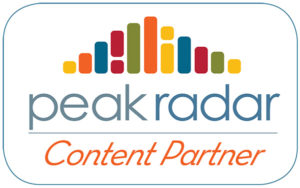 This Humanitou conversation is cross-posted at PeakRadar.com. | PeakRadar.com is the Pikes Peak region’s cultural calendar and digital cultural center, connecting residents and tourists with our vibrant arts community. Your source for what’s happening is PeakRadar.com!
This Humanitou conversation is cross-posted at PeakRadar.com. | PeakRadar.com is the Pikes Peak region’s cultural calendar and digital cultural center, connecting residents and tourists with our vibrant arts community. Your source for what’s happening is PeakRadar.com!
